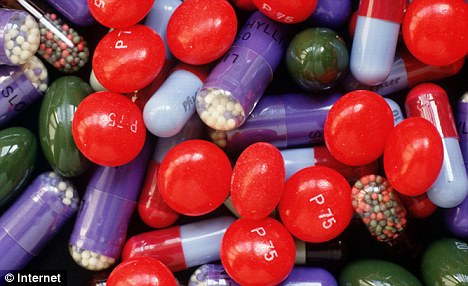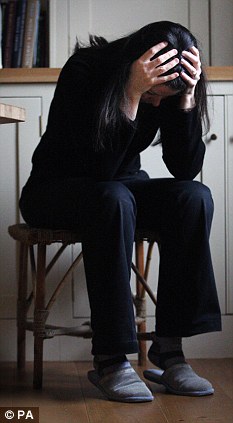Why antidepressants are simply a confidence trick: A leading psychologist claims taking sugar pills would work just as well
By
Professor Irving Kirsch
Last updated at 2:23 AM on 3rd August 2010
We spend more than £250 m a year on antidepressants in the UK - and it's a complete waste of money.
They are not much better than sugar pills, they have nasty side - effects, such as sexual dysfunction, and they increase young people's risk of suicide.
New research shows they don't even work on the brain in the way we thought they did.

Happy pills: We spend millions every year on antidepressants but they don't work any better than placebos
For years we were told depression was caused by low levels of a brain chemical called serotonin, and that antidepressants worked by boosting it.
But an Australian study published in the Archives of General Psychiatry shows that rather than low levels, depressed people might have double the normal amount in some parts of their brains.
Many people were surprised by these new findings, but I wasn't.
I've been studying antidepressants for more than a decade, and I knew that if they worked at all, it wasn't by changing brain chemistry.
The major reason you feel better when taking an antidepressant - maybe the only reason - is the placebo effect.
When I first published a paper back in 1998 saying that antidepressant drugs such as Prozac and Seroxat were not much better than a placebo, almost everyone thought it couldn't be true.

Healthier option: It is better to take placebos that have no negative side effects, than it is to take some antidepressants
There was so much evidence they worked. Thousands of people claimed the drugs had turned their lives round.
My colleagues said that I must have made a mistake: either I had looked at the wrong data, or I hadn't analysed it properly.
In fact, what I'd done was to look at the research on antidepressants in a different way from everyone else.
Other researchers were concentrating on how much better the drugs were than a placebo.
What I was interested in was finding out how strong the placebo effect was in treating depression.
I compared the placebo effect to having no treatment at all - no one had done that before.
'I was flabbergasted by just how big the placebo effect was'
We already knew that placebos could have a powerful effect in conditions such as pain, angina, ulcers and asthma.
Depression was an obvious next step, because when you are depressed you lose hope, and placebos give you hope.
But I was flabbergasted by just how big the placebo effect was.
Patients getting the drug improved: that was not surprising.
But patients given the placebo also got better - and by almost the same amount. Most of the drug improvement was really a placebo effect.
I decided the best way to convince people that antidepressants were largely placebos was to look at the drug companies' own data.
At the time, I was working at the University of Connecticut, so I used the Freedom of Information Act to force the U.S. Food & Drug Administration, which licenses drugs, to let me see all the trials the drug companies had run to get the most popular antidepressants approved.
That's when I got another shock.
More than half of the trials showed no difference at all between the drugs and the placebos - but most of those negative trials had never been published.

Controversial: 'Some researchers have been outraged by my work on the effects of antidepressants'
In other words, the benefits of antidepressants were even smaller than I'd thought, but the drug companies had hidden the data showing this.
No wonder everyone had thought I was wrong.
Information about the best way to treat patients was being hidden from doctors, and so billions of pounds were being wasted and patients were being exposed to dangerous chemicals for no real benefit.
My new analysis, published in 2002, found that all antidepressants, including the well-known SSRIs (serotonin selective reuptake inhibitors), had no clinically significant benefit over a placebo.
Other researchers took my findings more seriously this time, but it was still very unpopular with many psychiatrists.
I gave a lecture at one top psychiatric clinic and was almost driven out of the building by angry psychiatrists.
'This is outrageous,' they shouted.
'How can you say that our best drugs don't work?'
Everyone now agrees that hiding negative trials is bad.
But back then, the FDA thought it was perfectly all right. Knowing that there is negative data is of 'no practical value' to doctors, they argued, and it scares them away from prescribing antidepressants.
Drug firms now have to register all new trials on the web, so it's less easy to lose them, but they still don't have to publish the results.
As I studied the results from trials of antidepressants, something else jumped out.
Whatever type of drug was being tested, the amount of benefit patients reported stayed about the same.
Now this is odd, because antidepressants work in all sorts of different ways.
The cells in our brain communicate with each other by producing chemicals called neurotransmitters.
Most current antidepressants, the SSRIs, are supposed to work by increasing the amount of the neurotransmitter serotonin, which can affect mood.
But other antidepressants are supposed to work by boosting different neurotransmitters, such as norepinephrine and dopamine, that are also linked with mood.
'I'm now working on ways to produce the placebo effect without telling lies to patients'
There is even an antidepressant that brings the level of serotonin down instead of pushing it up.
All these drugs have the same effect. No matter what they do - or don't do - to serotonin, about 60 per cent of patients get better.
This means the serotonin theory must be nonsense.
If the effects of these drugs stay the same whatever chemicals they contain, then they are placebos. Maybe we have been barking up the wrong tree.
What happens to you in your life can make you depressed: when someone close to you dies, or when your business goes under, or you lose your job. But you don't need a pill to help you get through the bad times.
Research shows that talking therapies can make people feel better; and if you are helped in that way, then you are much less likely to relapse if the going gets tough later on.
The real message of my work is that a pill may help after all - but not the sort of pill you get a prescription for.
If the drugs are no better than a placebo, then why not give a placebo that doesn't have any of the nasty side-effects?
The problem is that doctors should not lie to their patients. So I'm now working on ways to produce the placebo effect without telling lies to patients.
The best way to make a placebo work really well is to have a good relationship with your doctor.
Recently, I worked on a study at Harvard University that showed this.
We divided patients with irritable bowel syndrome into three groups. One lot were put on a waiting list, and the other two groups got pretend acupuncture.
But the treatment was delivered in different ways. With some patients the doctors were warm and encouraging; with others, they were cool and businesslike.
All the patients said they felt better - even those on the waiting list. But while 44 per cent of those who saw businesslike doctors improved, 62 per cent treated by the warm ones benefitted.
Placebos don't work for all conditions, but if we could find a way to get those sorts of results without deceiving people, we'd save an awful lot of money and the risk of side-effects would be zero.
Not a great solution for drug company sales, perhaps - but wonderful for the rest of us.
• Irving Kirsch is professor of psychology at the University of Hull.
His book, The Emperor's New Drugs: Exploding The Antidepressant Myth, is published by The Bodley Head at £11.99.


I think they can work for some people. I tried various different ones for panic disorder, depression and ocd, and they didn't work. I then tried Cipralex/Lexapro, not expecting it to work, but after two months I started to feel better and it really worked wonders. I started to get a life back again.
It was hell to come off though. I withdrew extremely slowly, but still suffered vomiting, severe head and eye pains on withdrawal, and a feeling that my brain was moving and buzzing around my head. I was in bed for weeks, very ill. Antidepressants are not to be taken lightly, but I do believe they can work.
- anon, london, 05/8/2010 10:00
Report abuse